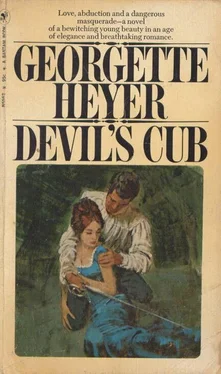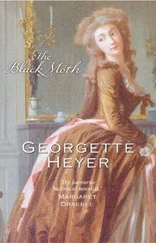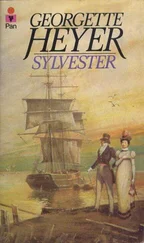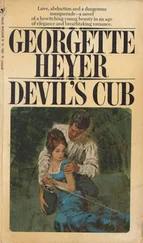
Georgette Heyer
Devil’s Cub
(Alastair-Audley — 2)
[Version 2.0-proofread and formatted by braven; Retained British spelling]
there was only one occupant of the coach, a gentleman who sprawled very much at his ease, with his legs stretched out before him, and his hands dug deep in the capacious pockets of his greatcoat. While the coach rattled over the cobbled streets of the town, the light from an occasional lantern or flambeau momentarily lit the interior of the vehicle and made a diamond pin or a pair of very large shoe-buckles flash, but since the gentleman lounging in the coach wore his gold-edged hat tilted low over his eyes, his face remained in shadow.
The coach was travelling fast, too fast for safety in a London street, and it soon drew out of the town, past the turnpike, on to Hounslow Heath. A faint moonlight showed the road to the coachman on the box, but so dimly that the groom beside him, who had been restive since the carriage drew out of St. James’s, gasped presently, as though he could no longer keep back the words: “Lord! you’ll overturn us! It’s a wicked pace!”
The only answer vouchsafed was a shrug, and a somewhat derisive laugh. The coach swayed precariously over a rough stretch of ground, and the groom, clutching the seat with both hands, said angrily: “You’re mad! D’you think the devil’s on your heels, man? Doesn’t he care? Or is he drunk?” The backward jerk of his head seemed to indicate that he was speaking of the man inside the coach.
“When you’ve been in his service a week you won’t call this a wicked pace,” replied the coachman. “When Vidal travels, he travels swift, d’ye see?”
“He’s drunk-three parts asleep!” the groom said.
“Not he.”
Yet the man inside the coach might well have been asleep for all the sign of life he gave. His long body swayed easily with the lurch of the coach, his chin was sunk in the folds of his cravat, and not even the worst bumps in the road had the effect of making him so much as grasp the strap that swung beside him. His hands remained buried in his pockets, remained so even when a shot rang out and the vehicle came to a plunging standstill. But apparently he was awake, for he raised his head, yawning, and leaning it back against the cushions turned it slightly towards the off-window.
There was a good deal of commotion outside; a rough voice was raised; the coachman was cursing the groom for his tardiness in firing the heavy blunderbuss in his charge; and the horses were kicking and rearing.
Someone rode up to the door of the coach and thrust in the muzzle of a big pistol. The moonlight cast a head in silhouette, and a voice said: “Hand over the pretties, my hearty!”
It did not seem as though the man inside the coach moved, but a gun spoke sharply, and a stabbing point of flame flashed in the darkness. The head and shoulders at the window vanished; there was the sound of a fall, of trampling hooves, of a startled shout, and the belated explosion of the blunderbuss.
The man in the coach drew his right hand out of his pocket at last. There was an elegant silver-mounted pistol in it, still smoking. The gentleman threw it on to the seat beside him, and crushed the charred and smouldering portion of his greatcoat between very long white fingers.
The door of the coach was pulled open, and the coachman jumped up on to the hastily let-down step. The lantern he held lit up the interior, and shone full into the face of the lounging man. It was a surprisingly young face, dark and extremely handsome, the curious vividness overlaid by an expression of restless boredom.
“Well?” said the gentleman coldly.
“Highwaymen, my lord. The new man being unused, so to say, to such doings, was late with the blunderbuss. There was three of them. They’ve made off-two of them, that is.”
“Well?” said the gentleman again.
The coachman seemed rather discomposed. “You’ve killed the other, my lord.”
“Certainly,” said the gentleman. “But I presume you have not opened the door to inform me of that.”
“Well, my lord-shan’t we-do I-his brains are lying in the road, my lord. Do we leave him-like that?”
“My good fellow, are you suggesting that I should carry a footpad’s corpse to my Lady Montacute’s drum?”
“No, my lord,” the coachman said hesitatingly. “Then-then-shall I drive on?”
“Of course drive on,” said the gentleman, faintly surprised.
“Very good, my lord,” the coachman said, and shut the door.
The groom on the box was still clasping the blunderbuss, and staring fascinated at the tumbled figure in the road. When the coachman climbed up on to the box again, and gathered the reins in his hands, he said: “Gawd, ain’t you going to do anything?”
“There isn’t anything you can do for him,” replied the other grimly.
“His head’s almost shot off!” shuddered the groom.
The equipage began to move forward. “Hold your tongue, can’t you? He’s dead, and that’s all there is to it.”
The groom licked his dry lips. “But don’t his lordship know?”
“Of course he knows. He don’t make mistakes, not with the pistols.”
The groom drew a deep breath, thinking still of the dead man left to wallow in his blood. “How old is he?” he blurted out presently.
“Twenty-four all but a month or two.”
“Twenty-four! and shoots his man and leaves the corpse as cool as you please! My Gawd!”
He did not speak again until the coach had arrived at its destination, and then he seemed to be so lost in meditation that the coachman had to nudge him sharply. He roused himself then and jumped off the box to open the coach door. As his master stepped languidly down, he looked covertly at him, trying to see some sign of agitation in his face. There was none. His lordship sauntered up the steps to the stone porch, and passed into the lighted hall.
“My Gawd!” said the groom again.
Inside the house two lackeys hovered about the latecomer to take his hat and coat. There was another gentleman in the hall, just about to go up the wide stairway to the saloon. He was good-looking in a rather florid style, with very heavily-arched brows and a roving eye. His dress proclaimed the Macaroni, for he wore a short coat decorated with frog-buttons, fine striped breeches with bunches of strings at the knee, and a waistcoat hardly reaching below the waist. The frills of his shirt front stuck out at the top, and instead of the cravat, he displayed a very full handkerchief tied in a bow under his chin. On his head he wore an amazingly tall ladder-toupet, dusted with blue hair powder, and he carried in his hand a long tasselled cane.
He turned as my lord entered, and when he saw who it was, came across the hall. “I hoped I was the last,” he complained. He raised his quizzing-glass, and through it peered at the hole in his lordship’s coat “My dear Vidal!” he said, shocked. “My dear fellow! Egad, my lord, your coat!”
One of the lackeys had it over his arm. My lord shook out his Dresden ruffles, but carelessly as though it mattered very little to him to be point-de-vice . “Well, Charles, what of my coat?” he asked.
Mr. Fox achieved a shudder. “There’s a damned hole in it, Vidal,” he protested. He moved forward and very gingerly lifted a fold of the garment “And a damned smell of powder, Vidal,” he said. “You’ve been shooting someone.”
His lordship leaned against the banister, and opened his snuff-box. “Some scum of a footpad only,” he said.
Читать дальше













